Panasonic AJ-SD93E, AJ-SD93P User Manual

Operating Instructions
Digital Video Cassette Recorder
AJ-
 P
P
Model No. AJ- |
E |
Before operating this product, please read the instructions carefully and save this manual for future use.
P |
|
E |
Printed in Japan |
ENGLISH |
|
VQT0L54 |
S0704A0 -M D |
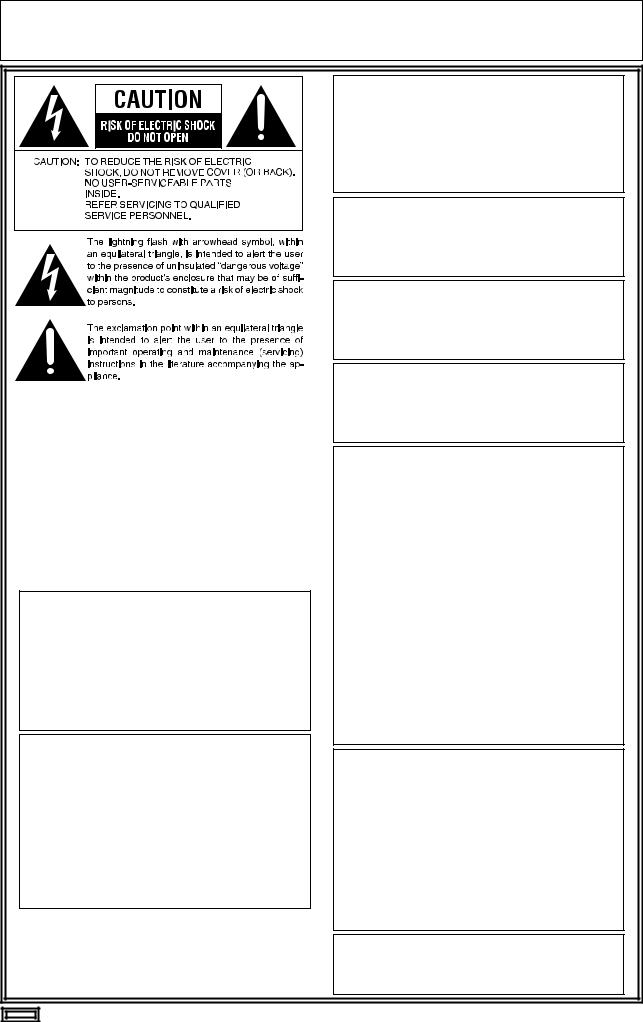
For AJ-SD93P
IMPORTANT
“Unauthorized recording of copyrighted television programmes, video tapes and other materials may infringe the right of copyright owners and be contrary to copyright laws.”
 THIS APPARATUS MUST BE GROUNDED
THIS APPARATUS MUST BE GROUNDED
To ensure safe operation the three-pin plug must be inserted only into a standard three-pin power outlet which is effectively grounded through normal household wiring.
Extension cords used with the equipment must be threecore and be correctly wired to provide connection to the ground. Incorrectly wired extension cords can be extremely hazardous.
The fact that the equipment operates satisfactorily does not imply that it is grounded, and the installation is not necessarily safe. For your safety, if in any doubt about the effective grounding of the equipment or power outlet, please consult a qualified electrician.
CAUTION:
TO COMPLETELY DISCONNECT THIS APPARATUS FROM THE AC MAINS, DISCONNECT THE POWER SUPPLY CORD PLUG FROM THE AC RECEPTACLE.
THE AC OUTLET (MAIN SOCKET) SHALL BE INSTALLED NEAR THE EQUIPMENT AND SHALL BE EASILY ACCESSIBLE.
WARNING:
TO REDUCE THE RISK OF FIRE OR SHOCK HAZARD, DO NOT EXPOSE THIS EQUIPMENT TO RAIN OR MOISTURE.
TO REDUCE THE RISK OF FIRE OR SHOCK HAZARD, KEEP THIS EQUIPMENT AWAY FROM ALL LIQUIDS-USE AND STORE ONLY IN LOCATIONS WHICH ARE NOT EXPOSED TO THE RISK OF DRIPPING OR SPLASHING LIQUIDS, AND DO NOT PLACE ANY LIQUID CONTAINERS ON TOP OF THE EQUIPMENT.
CAUTION:
Do not install or place this deck in a bookcase, built-in cabinet or any other confined space in order to maintain adequate ventilation. Ensure that curtains and any other materials do not obstruct the ventilation to prevent risk of electric shock or fire hazard due to overheating.
CAUTION:
TO REDUCE THE RISK OF FIRE OR SHOCK HAZARD AND ANNOYING INTERFERENCE, USE THE RECOMMENDED ACCESSORIES ONLY.
CAUTION:
TO REDUCE THE RISK OF FIRE OR SHOCK HAZARD, REFER MOUNTING OF THE OPTIONAL INTERFACE BOARD TO QUALIFIED SERVICE PERSONNEL.
CAUTION:
TO REDUCE THE RISK OF FIRE OR SHOCK HAZARD, REFER CHANGE OF SWITCH SETTING INSIDE THE DECK TO QUALIFIED SERVICE PERSONNEL.
FCC Note:
This equipment has been tested and found to comply with the limits for a class A digital device, pursuant to Part 15 of the FCC Rules. These limits are designed to provide reasonable protection against harmful interference when the equipment is operated in a commercial environment. This equipment generates, uses, and can radiate radio frequency energy and, if not installed and used in accordance with the instruction manual, may cause harmful interference to radio communications. Operation of this equipment in a residential area is likely to cause harmful interference in which case the user will be required to correct the interference at his own expense.
Warning: To assure continued FCC emission limit compliance, the user must use only shielded interface cables when connecting to external units. Also any unauthorized changes or modifications to this equipment could void the user’s authority to operate it.
CAUTION:
This apparatus can be operated at a voltage in the range of 100 – 240 V AC.
Voltage other than 120 V is not intended for U.S.A. and Canada.
CAUTION:
Operation at a voltage other than 120 V AC may require the use of a different AC plug. Please contact either a local or foreign Panasonic authorized service center for assistance in selecting an alternate AC plug.
CAUTION:
Even when the Power Switch is in the OFF position, a small current flows the filter circuit.
indicates safety information.
– 2 –
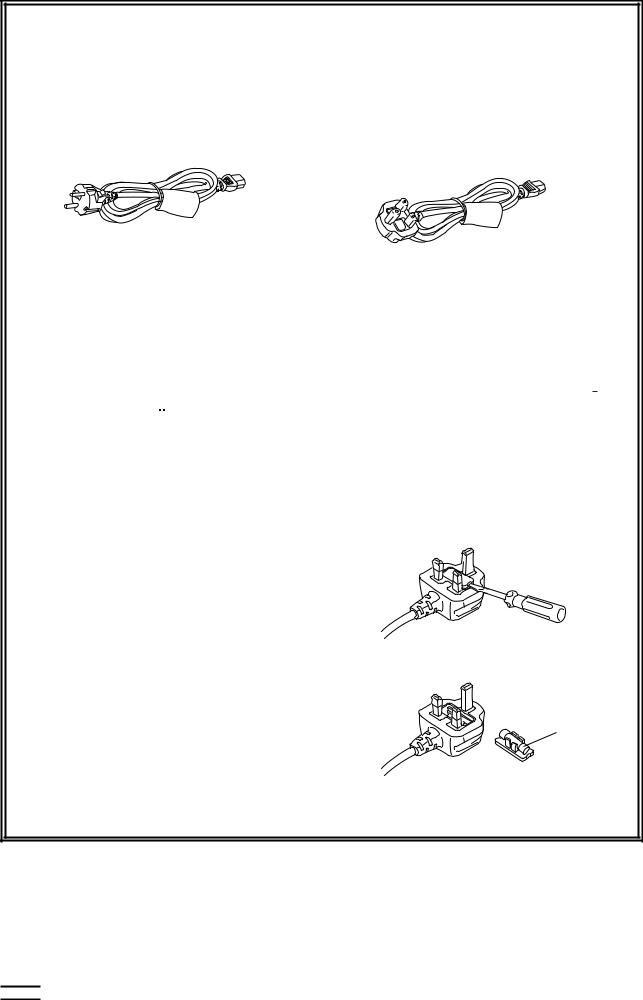
For AJ-SD93E
Caution for AC Mains Lead
FOR YOUR SAFETY PLEASE READ THE FOLLOWING TEXT CAREFULLY.
This product is equipped with 2 types of AC mains cable. One is for continental Europe, etc. and the other one is only for U.K.
Appropriate mains cable must be used in each local area, since the other type of mains cable is not suitable.
FOR CONTINENTAL EUROPE, ETC. |
FOR U.K. ONLY |
Not to be used in the U.K. |
If the plug supplied is not suitable for your socket |
|
outlet, it should be cut off and appropriate one fitted. |
|
|
FOR U.K. ONLY
This appliance is supplied with a moulded three pin mains plug for your safety and convenience.
A 13 amp fuse is fitted in this plug.
Should the fuse need to be replaced please ensure that the replacement fuse has a rating of 13 amps and that it is approved by ASTA or BSI to BS1362.
Check for the ASTA mark  or the BSI mark
or the BSI mark  on the body of the fuse.
on the body of the fuse.
If the plug contains a removable fuse cover you must ensure that it is refitted when the fuse is replaced.
If you lose the fuse cover the plug must not be used until a replacement cover is obtained.
A replacement fuse cover can be purchased from your local Panasonic Dealer.
IF THE FITTED MOULDED PLUG IS UNSUITABLE FOR THE SOCKET OUTLET IN YOUR HOME THEN THE FUSE SHOULD BE REMOVED AND THE PLUG CUT OFF AND DISPOSED OF SAFELY. THERE IS A DANGER OF SEVERE ELECTRICAL SHOCK IF THE CUT OFF PLUG IS INSERTED INTO ANY 13 AMP SOCKET.
If a new plug is to be fitted please observe the wiring code as shown below.
If in any doubt please consult a qualified electrician. WARNING: THIS APPLIANCE MUST BE EARTHED. IMPORTANT: The wires in this mains lead are coloured in accordance with the following code:
Green-and-Yellow: Earth
Blue: Neutral Brown: Live
As the colours of the wires in the mains lead of this appliance may not correspond with the coloured markings identifying the terminals in your plug, proceed as follows:
 The wire which is coloured GREEN-AND-YELLOW must be connected to the terminal in the plug which is marked with the letter E or by the Earth symbol
The wire which is coloured GREEN-AND-YELLOW must be connected to the terminal in the plug which is marked with the letter E or by the Earth symbol  or coloured GREEN or GREEN-AND-YELLOW.
or coloured GREEN or GREEN-AND-YELLOW.
 The wire which is coloured BLUE must be connected to the terminal in the plug which is marked with the letter N or coloured BLACK.
The wire which is coloured BLUE must be connected to the terminal in the plug which is marked with the letter N or coloured BLACK.
 The wire which is coloured BROWN must be connected to the terminal in the plug which is marked with the letter L or coloured RED.
The wire which is coloured BROWN must be connected to the terminal in the plug which is marked with the letter L or coloured RED.
How to replace the fuse
1. Open the fuse compartment with a screwdriver.
2. Replace the fuse.
Fuse



 indicates safety information.
indicates safety information.
– 3 –
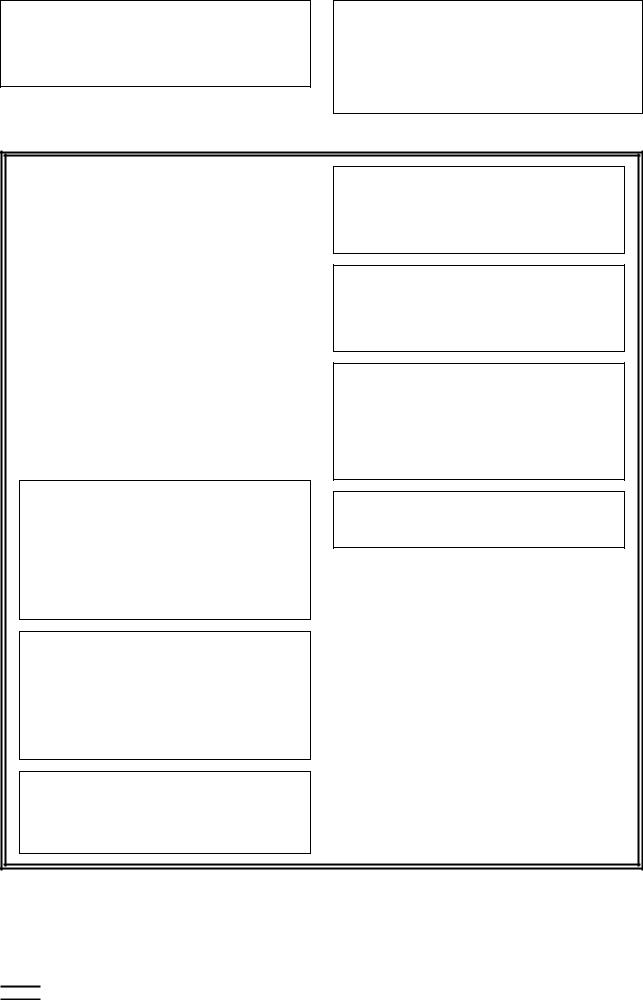
For AJ-SD93E
IMPORTANT
“Unauthorized recording of copyrighted television programmes, video tapes and other materials may infringe the right of copyright owners and be contrary to copyright laws.”
Operating precaution
Operation near any appliance which generates strong magnetic fields may give rise to noise in the
video and audio signals. If this should be the case, deal with the situation by, for instance, moving the source of the magnetic fields away from the unit before operation.
 THIS APPARATUS MUST BE EARTHED
THIS APPARATUS MUST BE EARTHED
To ensure safe operation the three-pin plug must be inserted only into a standard three-pin power point which is effectively earthed through the normal household wiring.
Extension cords used with the equipment must be three-core and be correctly wired to provide connection to earth. Wrongly wired extension cords are a major cause of fatalities.
The fact that the equipment operates satisfactorily does not imply that the power point is earthed and that the installation is completely safe. For your safety, if in any doubt about the effective earthing of the power point, consult a qualified electrician.
CAUTION:
TO REDUCE THE RISK OF FIRE OR SHOCK HAZARD, REFER MOUNTING OF THE OPTIONAL INTERFACE BOARD TO AUTHORIZED SERVICE PERSONNEL.
CAUTION:
TO REDUCE THE RISK OF FIRE OR SHOCK HAZARD, REFER CHANGE OF SWITCH SETTING INSIDE THE DECK TO QUALIFIED SERVICE PERSONNEL.
 DO NOT REMOVE PANEL COVER BY UNSCREWING.
DO NOT REMOVE PANEL COVER BY UNSCREWING.
To reduce the risk of electric shock, do not remove cover. No user serviceable parts inside.
Refer servicing to qualified service personnel.
CAUTION:
Do not install or place this deck in a bookcase, built-in cabinet or any other confined space in order to maintain adequate ventilation. Ensure that curtains and any other materials do not obstruct the ventilation to prevent risk of electric shock or fire hazard due to overheating.
CAUTION:
TO COMPLETELY DISCONNECT THIS APPARATUS FROM THE AC MAINS, DISCONNECT THE POWER SUPPLY CORD PLUG FROM THE AC RECEPTACLE.
THE AC OUTLET (MAIN SOCKET) SHALL BE INSTALLED NEAR THE EQUIPMENT AND SHALL BE EASILY ACCESSIBLE.
CAUTION:
Even when the Power Switch is in the OFF position, a small current flows the filter circuit.
WARNING:
TO REDUCE THE RISK OF FIRE OR SHOCK HAZARD, KEEP THIS EQUIPMENT AWAY FROM ALL LIQUIDS-USE AND STORE ONLY IN LOCATIONS WHICH ARE NOT EXPOSED TO THE RISK OF DRIPPING OR SPLASHING LIQUIDS, AND DO NOT PLACE ANY LIQUID CONTAINERS ON TOP OF THE EQUIPMENT.
CAUTION:
TO REDUCE THE RISK OF FIRE OR SHOCK HAZARD AND ANNOYING INTERFERENCE, USE THE RECOMMENDED ACCESSORIES ONLY.



 indicates safety information.
indicates safety information.
– 4 –

Contents
Introduction ...................................................... |
6 |
Included accessories ...................................... |
6 |
Optional boards ............................................... |
6 |
Features ........................................................... |
7 |
Parts and their functions ................................. |
8 |
• Front Panel ........................................................ |
8 |
• Display Panel ................................................... |
11 |
• Rear Panel ....................................................... |
12 |
Tapes ............................................................... |
13 |
IEEE 1394 digital interface............................. |
14 |
Search stick .................................................... |
15 |
PF (Programmable Function) ........................ |
15 |
• Registering the items in the PF buttons ........... |
15 |
• Performing operations using the PF buttons.... |
15 |
Repeat playback ............................................. |
16 |
Setup (initial settings).................................... |
17 |
Setup menus................................................... |
18 |
• SYSTEM menu ................................................ |
20 |
• USER menus ................................................... |
21 |
<BASIC> ..................................................... |
21 |
<OPERATION>........................................... |
23 |
<INTERFACE> ........................................... |
24 |
<TAPE PROTECT> .................................... |
25 |
<TIME CODE>............................................ |
26 |
<VIDEO>..................................................... |
28 |
<AUDIO> .................................................... |
30 |
<V BLANK>................................................. |
32 |
<DIF> .......................................................... |
33 |
<MENU> ..................................................... |
34 |
Time code/user bit.......................................... |
35 |
Superimpose screen ...................................... |
36 |
Video head cleaning....................................... |
37 |
Condensation ................................................. |
37 |
Maintenance.................................................... |
37 |
Error messages .............................................. |
38 |
Specifications ................................................. |
43 |
– 5 –
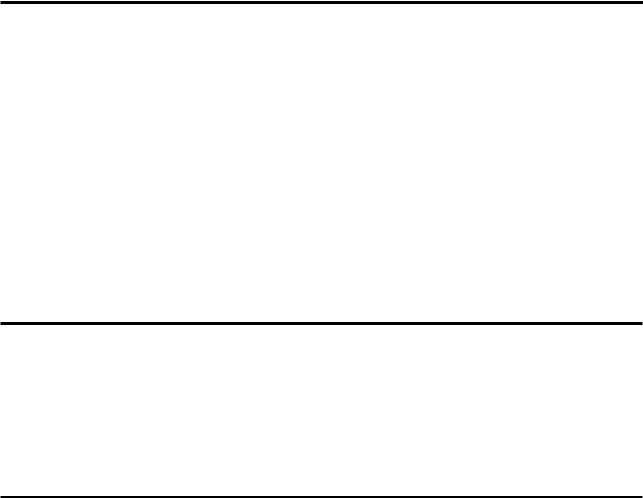
Introduction
The model AJ-SD93 multi-purpose digital VTR uses small, |
• It has a compact and lightweight design so that it can |
1/4-inch wide cassette tapes to record and play back |
readily be carried around or easily installed in a rack. |
images with a high picture quality at a video recording rate |
|
of 50 Mbps while it can also record and play back |
|
DVCPRO (25 Mbps) format tapes as well as play back |
|
consumer-use DV/DVCAM tapes. |
|
It comes with the following features. |
|
•This high-picture-quality VTR incorporates digital compression technology to dramatically reduce the deterioration of the picture quality and sound quality resulting from dubbing.
•It is equipped with an IEEE 1394 interface as a standard feature and, in compliance with the IEEE 1394 standard, it can digitally transmit video and audio signals as well as time code signals to a digital VTR, etc.
Included accessories
 3-pin power cord x 1
3-pin power cord x 1
Optional boards
•Analog interface board:
AJ-YA93P
•SDI interface board:
AJ-YA94G
Use only the optional boards listed above.
– 6 –

Features
 Compact and lightweight
Compact and lightweight
This unit is a DVCPRO50 digital VTR which uses 1/4- inch wide cassette tapes. Its compact and lightweight design makes it ideal as a feeder for non-linear editing or as a viewer installed on a desk-top, for instance.
 Up to 92 minutes of recording
Up to 92 minutes of recording
M cassettes (max. 33 minutes: using the AJ-5P33MP) and L cassettes (max. 92 minutes: using the AJ5P92LP) can be used with this unit. Tape width is a compact 1/4-inch.
 Superior picture quality
Superior picture quality
Superior picture quality is achieved through 4:2:2 component signal recording at 2 times the recording rate of the DVCPRO format.
 4-channel, high-sound-quality digital audio
4-channel, high-sound-quality digital audio
The unit can record and play back 4-channel PCM audio. (However, it does not support cue recording or playback.)
 IEEE 1394 digital input/output
IEEE 1394 digital input/output
The IEEE 1394 digital interface, which is provided as a standard feature, enables DVCPRO50 or DVCPRO/DV compressed digital video and audio signals to be input and output with no accompanying deterioration of the picture quality.
 Compatibility with DVCPRO (25 Mbps) format
Compatibility with DVCPRO (25 Mbps) format
This unit can record, play back and edit material in the DVCPRO (25 Mbps) format.
 Compatibility with general consumer video equipment
Compatibility with general consumer video equipment
DV cassette tapes containing material shot with a consumer digital camera or the like can be played back on this unit. A cassette adapter (AJ-CS455P) is necessary when a mini DV cassette tape is to be used.
 Digital slow motion
Digital slow motion
Panasonic's original digital slow-motion technology makes it possible to obtain clear pictures even during slow playback at speeds ranging from -0.43x to +0.43x. (DVCPRO, DVCPRO50 only)
 Search stick
Search stick
The unit comes with a search stick (stick controller). It is used to control variable-speed playback during searches, etc.
In addition, the settings for the on-screen menus and time code generator can also be accomplished easily using the search stick.
 PF (Programmable Function) buttons
PF (Programmable Function) buttons
The unit comes with three PF buttons. Any three frequently used setup menus can be selected, and by operating these buttons on the front panel, it is possible to change the menu settings.
 Recording and playback of UMID information
Recording and playback of UMID information
Recording and playback of UMID (Unique Material Identifier) information complies with the SMPTE 330M standard.
UMID information can be checked on the DIAG menu.
UMID information cannot be played back correctly by VTRs that do not support the recording and playback of UMID information.
In addition, even if a VTR that does not support the recording and playback of UMID information is connected to this unit and recording performed, UMID information will not be recorded correctly.
 Time code
Time code
The unit incorporates a TCG (time code generator)/TCR (time code reader). In addition to the internal time code, use of the analog interface board (option: AJ-YA93P) enables the external time code input or input signal VITC to be recorded on the unit as the time code.
 Multi-functional interfaces
Multi-functional interfaces
•Serial digital input/output
Use of the SDI interface board (option: AJ-YA94G) enables interfacing of the serial digital component signals.
•Analog video/audio input/output
Use of the analog interface board (option: AJ-YA93P) enables the following signals :
-Composite video input/output
-Component video input/output
-Reference video input (BNC, input x1; loop-through x1)
-Analog audio input/output
Input: XLR, 4 channels; output: XLR, 4 channels
-Time code input/output (BNC connectors, 1 each for input, output)
-9-pin control input (RS-422)
 Menu-based setup
Menu-based setup
The setup settings, which are conducted prior to operating the unit, are performed while viewing the setup menus on the unit’s display or a TV monitor.
– 7 –
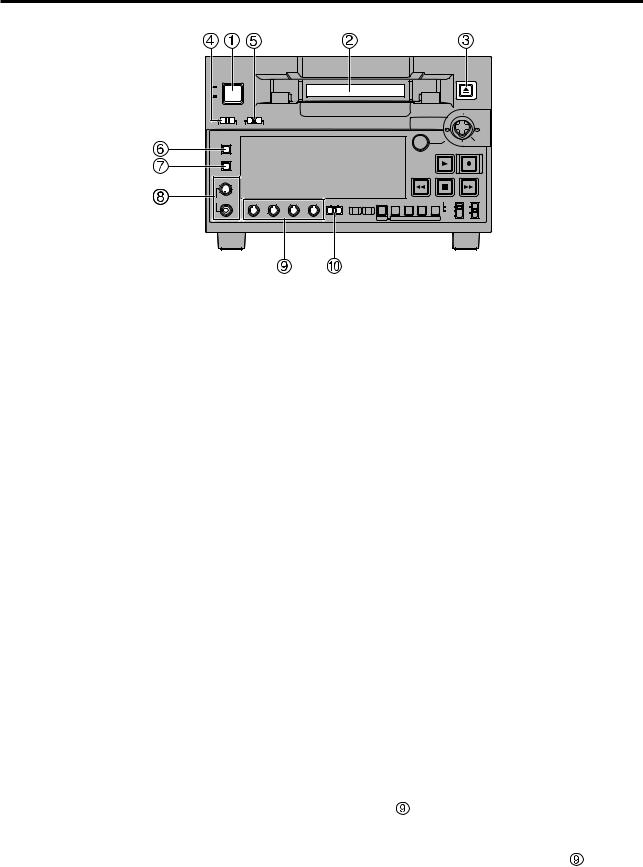
Parts and their functions
Front panel
POWER |
|
|
|
|
|
|
|
|
|
EJECT |
ON |
|
|
|
|
|
|
|
|
|
|
OFF |
|
|
|
|
|
|
|
|
|
|
CONTROL |
REC INHIBIT |
|
|
|
|
|
|
|
|
|
LOCAL REMOTE |
OFF |
ON |
|
|
|
|
|
|
|
|
METER |
|
|
|
|
|
|
|
|
|
PUSH |
FULL/FINE |
|
|
|
|
|
|
|
|
|
SHTL/SLOW |
|
|
|
|
|
|
|
SEARCH |
PLAY |
REC |
|
|
|
|
|
|
|
|
|
|
||
MONITOR SEL |
|
|
|
|
|
|
|
|
|
|
|
|
|
|
|
|
|
|
REW |
STOP |
FF |
HEADPHONES |
CH 1 |
CH 2 |
CH 3 |
CH 4 |
REC PB |
INPUT SELECT |
COUNTER RESET |
TC |
INT |
TCG SUPER |
|
|
|
|
|
VIDEO AUDIO |
PRESET |
MENU |
ON |
||
|
|
|
|
|
|
|
|
REGEN |
||
|
|
|
|
|
|
|
|
|
PRESET |
OFF |
|
|
|
|
|
|
|
|
|
EXT |
|
|
|
|
|
|
UNITY |
PF |
PF1 PF2 |
PF3 |
DIAG |
|
 POWER switch
POWER switch
 Cassette insertion slot
Cassette insertion slot
 EJECT button
EJECT button
When this button is pressed, the tape is unloaded and the cassette is ejected automatically a few seconds later.
When CTL display has been selected for the counter display, the display is reset.
EJECT button operation can be enabled or disabled with setup menu No. 115 (EJECT SW INH).
 CONTROL switch
CONTROL switch
This is selected to control the unit from an external source using the REMOTE connector.
REMOTE: Set to this position to control the unit using the 9-pin REMOTE connector and IEEE 1394 AV/C commands.
LOCAL : Set to this position to control the unit using the controls on the unit's operation panel.
 REC INHIBIT switch
REC INHIBIT switch
This switch is used to enable or disable recording on the cassette tape.
ON:
Recording on the cassette tape is disabled (inhibited).
In this state, the REC INH lamp lights on the display panel.
OFF:
Recording on the cassette tape is enabled so long as the accidental erasure prevention mechanism on the cassette tape is set to enable recording.
 METER (FULL/FINE) selector button
METER (FULL/FINE) selector button
This button is used to select the scale display for the
audio level meter. |
|
|
|
FULL mode |
: The standard scale (– ∞ to 0 dB) is |
||
|
selected. |
|
|
FINE mode |
: The scale in 0.5 dB increments is |
||
|
selected. The |
|
position indicates |
|
|
||
|
the standard level of –20 dB (–18 dB). |
||
|
(See page 11) |
|
|
 MONITOR SEL button
MONITOR SEL button
This button is used to select the audio signals which are to be output to the AUDIO MON L and R connectors.
Each time the button is pressed, the audio signals to be output to the AUDIO MON L or R connector are changed in the following sequence.
L : [CH1] → [CH3] →[CH1] → [CH2] →[CH3] →[CH4] R : [CH2] [CH4] [CH1] [CH2] [CH3] [CH4]
→ [CH1+CH2][CH1+CH2] →[CH3+CH4][CH3+CH4]
Which signal is currently selected is displayed by the lighting of the L or R lamp on the level meter display.
 Headphone jack and volume control
Headphone jack and volume control
When stereo headphones are connected to the headphone jack, the sound can be monitored using the headphones during recording or playback.
 Audio level control knobs
Audio level control knobs
These knobs are used to adjust the recording and playback level of the PCM audio signals (CH1, CH2, CH3 and CH4).
Whether the recording level or playback level is to be adjusted is selected using the audio level control selector switch  .
.
Note:
The level of the IEEE 1394 digital input/output audio signals cannot be adjusted.
 Audio level control selector switch
Audio level control selector switch
UNITY: At this position, the audio signals are recorded or played back at a fixed level regardless of the position of the audio level control knobs
|
. |
|
REC |
: At this position, the audio signals are |
|
|
recorded at the level which has been adjusted |
|
|
by the audio level control knobs |
. |
PB |
: At this position, the audio signals are played |
|
|
back at the level which has been adjusted by |
|
the audio level control knobs  .
.
Note:
It is not possible to set this switch so that both the recording level and playback level can be adjusted. When REC is selected, UNITY (fixed level) is set for the playback level; when PB is selected, UNITY is set for the recording level.
– 8 –
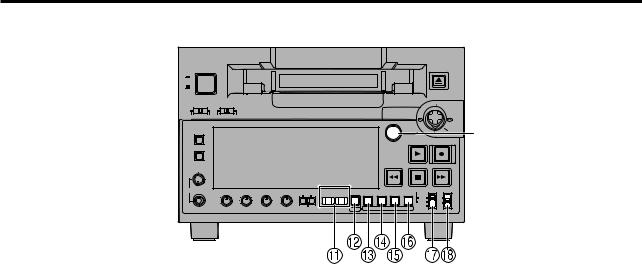
Parts and their functions (continued)
Front panel
POWER |
|
|
|
|
|
|
|
|
|
EJECT |
ON |
|
|
|
|
|
|
|
|
|
|
OFF |
|
|
|
|
|
|
|
|
|
|
CONTROL |
REC INHIBIT |
|
|
|
|
|
|
|
|
|
LOCAL REMOTE |
OFF |
ON |
|
|
|
|
|
|
|
|
METER |
|
|
|
|
|
|
|
|
|
PUSH |
FULL/FINE |
|
|
|
|
|
|
|
|
|
SHTL/SLOW |
|
|
|
|
|
|
|
SEARCH |
PLAY |
REC |
|
|
|
|
|
|
|
|
|
|
||
MONITOR SEL |
|
|
|
|
|
|
|
|
|
|
|
|
|
|
|
|
|
|
REW |
STOP |
FF |
HEADPHONES |
CH 1 |
CH 2 |
CH 3 |
CH 4 |
REC PB |
INPUT SELECT |
COUNTER RESET |
TC |
INT |
TCG SUPER |
|
|
|
|
|
VIDEO AUDIO |
PRESET |
MENU |
ON |
||
|
|
|
|
|
|
|
|
REGEN |
||
|
|
|
|
|
|
|
|
|
PRESET |
OFF |
|
|
|
|
|
|
|
|
|
EXT |
|
|
|
|
|
|
UNITY |
PF |
PF1 PF2 |
PF3 |
DIAG |
|
SEARCH button
 INPUT SELECT buttons
INPUT SELECT buttons
These buttons are used to switch the video and audio input signals. They can also be used to switch the input signals to the internal reference signal selected as the setup menu item No.600 (INT SG) setting.
VIDEO:
Each time the VIDEO button is pressed, the input video signal selection is switched in the order of [Y PB PR] →[CMPST] → [SDI] → [1394] → [SG].
•When SG has been selected, the signal is switched to the internal reference signal selected
as the setup menu item No.600 (INT SG) setting.
AUDIO:
Each time the AUDIO button is pressed, the input audio signal selection is switched in the order of [ANALOG] → [SDI] → [1394] → [SG].
Notes:
•It is possible to inhibit the input switch operations (video and audio) of the INPUT SELECT buttons using setup menu item No.112 (V IN SEL INH) and item No.113 (A IN SEL INH).
•The Y PB PR and CMPST settings for the VIDEO button as well as the ANALOG setting for the AUDIO button cannot be selected unless the optional board (AJ-YA93P) has been installed.
•The SDI setting for the VIDEO and AUDIO buttons cannot be selected unless the optional board (AJYA94G) has been installed.
 PF button
PF button
When this button is pressed, buttons  to
to  function as the PF1, PF2 and PF3 buttons, respectively. When it is pressed again before another button is pressed, these modes are canceled.
function as the PF1, PF2 and PF3 buttons, respectively. When it is pressed again before another button is pressed, these modes are canceled.
When this button is pressed together with the MENU/DIAG button  , the DIAG screen is displayed.
, the DIAG screen is displayed.
 COUNTER/PF1 button
COUNTER/PF1 button
Each time this button is pressed, the counter display on the display panel changes by one step in the following sequence: CTL → TC → UB.
 RESET/PF2 button
RESET/PF2 button
When this button is pressed in the CTL mode, the counter display is reset to [00:00:00:00].
When it is pressed in the TC/UB mode while holding down the TC PRESET button  , the generator is reset.
, the generator is reset.
 TC PRESET/PF3 button
TC PRESET/PF3 button
This button is used to set the TC or UB values.
 MENU/DIAG button
MENU/DIAG button
When this button is pressed, the setup menus are displayed on the TV monitor (but only when the VIDEO MON connector is used), and the setup menu numbers are displayed on the unit’s display panel.
When it is pressed again, the setup menu settings are exited, and the original status is restored.
When the button is pressed while holding down the PF button  , the VTR information is displayed. When it is pressed again, the original display is restored. The VTR information consists of the WARNING, HOURS METER, UMID and DIF STATUS 1, 2 information. The SEARCH button is used to switch the displays between these kinds of information.
, the VTR information is displayed. When it is pressed again, the original display is restored. The VTR information consists of the WARNING, HOURS METER, UMID and DIF STATUS 1, 2 information. The SEARCH button is used to switch the displays between these kinds of information.
Descriptions of the warnings are displayed on the WARNING screen. The deck’s serial number, poweron time, drum rotation time, tape travel time, number of loading times, number of power on/off times, etc. are displayed on the HOURS METER screen. The UMID (Unique Material Identifier) information is displayed on the UMID INFO screen. The IEEE 1394 digital interface information is displayed on the DIF STATUS 1, 2 screen.
 TCG switch
TCG switch
REGEN:
The internal time code generator is synchronized with the time code which the time code reader has read from the tape.
The signal that is to be used for regeneration is selected using setup menu No. 503 (TCG REGEN).
PRESET:
The time code generator can be preset (see page 35) on the operation panel or by remote control.
EXT:
The external time code which is input from the time code input connector or video signal VITC, or IEEE1394 digital input signal is used. Which of the two is to be set is selected using setup menu No. 505 (EXT TC SEL).
 SUPER switch
SUPER switch
ON : The time code and other superimposed information are output to the VIDEO MON connector.
OFF : No superimposed information is output.
– 9 –
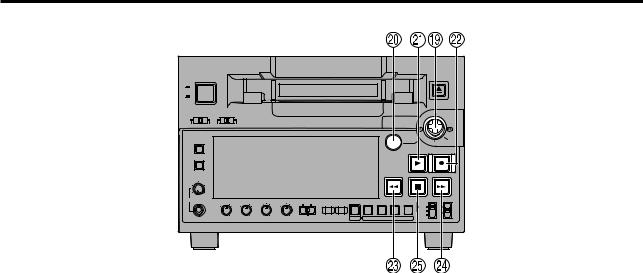
Parts and their functions (continued)
Front panel
 Search stick
Search stick
|
POWER |
|
|
|
EJECT |
ON |
|
|
|
|
|
OFF |
|
|
|
|
|
CONTROL |
REC INHIBIT |
|
|
||
LOCAL |
REMOTE |
OFF |
ON |
|
|
METER |
|
|
|
PUSH |
|
FULL/FINE |
|
|
|
SHTL/SLOW |
|
|
|
|
SEARCH |
PLAY |
REC |
|
|
|
|
|
|
MONITOR SEL |
|
|
|
|
|
|
|
|
|
|
|
|
|
|
|
REW |
STOP |
FF |
HEADPHONES |
CH 1 |
CH 2 |
CH 3 |
CH 4 |
REC |
PB |
INPUT SELECT |
|
COUNTER RESET |
TC |
INT |
TCG SUPER |
|
|
|
|
|
VIDEO AUDIO |
|
PRESET |
MENU |
ON |
|||
|
|
|
|
|
|
|
|
|
|
REGEN |
||
|
|
|
|
|
|
|
|
|
|
|
PRESET |
OFF |
|
|
|
|
|
|
|
|
|
|
|
EXT |
|
|
|
|
|
|
UNITY |
|
PF |
PF1 PF2 |
PF3 |
DIAG |
|
|
This is used for shuttle, slow and other variable-speed playback. It is also used for the menu settings, etc. The stick can be moved upward, downward, to the left or to the right, and it can also be pressed to initiate operations.
 SEARCH button
SEARCH button
When this button is pressed, the search mode is established.
 PLAY button
PLAY button
When this button is pressed, playback starts.
When this button and the REC button are pressed together, recording starts.
 REC button
REC button
When this button is pressed together with the PLAY button, recording starts.
When it is pressed during playback, a search, fast forwarding or rewinding, the E-E mode pictures and audio signals can be monitored while it is held down.
When it is pressed in the stop mode, the E-E mode pictures and audio signals can be monitored. (When it is pressed during playback, the servo will be disrupted.) When the STOP button is pressed, the original pictures and sound are restored.
 REW button
REW button
When this button is pressed, the tape is rewound. The rewinding speed can be selected using setup menu No.102 (FF. REW MAX).
 FF button
FF button
When this button is pressed, the tape is fast forwarded.
The fast forwarding speed can be selected using setup menu No.102 (FF. REW MAX).
 STOP button
STOP button
When this button is pressed, the tape stops traveling, and when TAPE has been selected for the setup menu item No.122 (STOP EE SEL) setting, the still images can be monitored.
Even in the stop mode, the drum continues to rotate, and the tape remains in close contact with the drum. When the stop mode continues beyond a specific time period, the unit is automatically set to the standby OFF mode or STEP FWD mode in order to protect the tape. (This is set using setup menu item No.400 to 403.) Immediately after a cassette has been loaded in the unit, the stop mode is established.
– 10 –
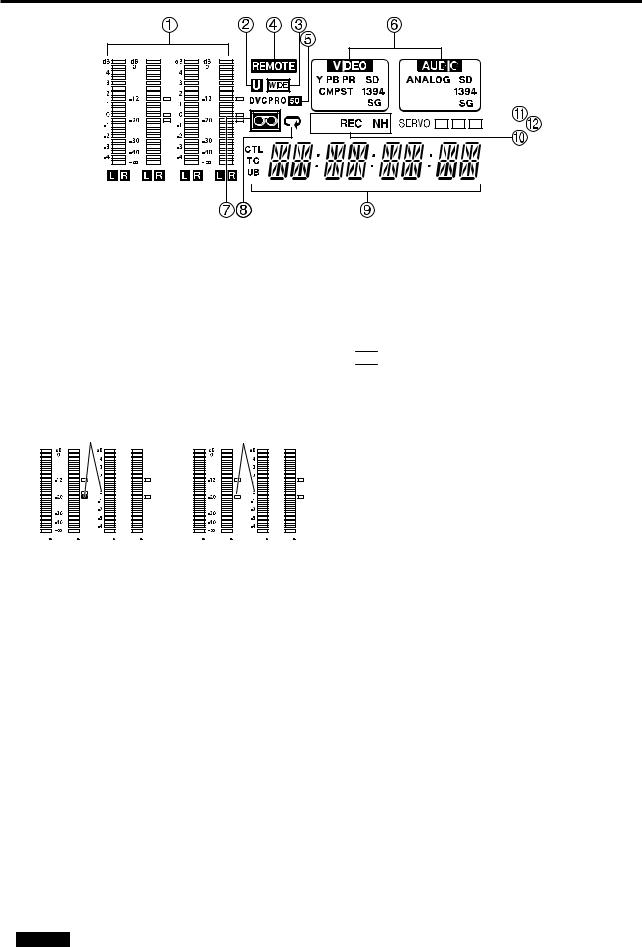
Parts and their functions (continued)
Display panel
 Level meter
Level meter
This displays the levels of the PCM audio signals for CH1, CH2, CH3 and CH4.
During recording and when the E-E mode is selected, it shows the levels of the input audio signals; during playback, it shows the levels of the output audio signals.
The audio level display is switched between the FULL mode and FINE mode using the METER selector button  . (See page 8)
. (See page 8)
|
|
For AJ-SD93P |
|
|
|
|
|
For AJ-SD93E |
|
|
|||||||||||||||||||||||
|
|
|
Reference level |
|
|
|
|
|
|
Reference level |
|
|
|||||||||||||||||||||
|
|
|
(–20 dB) |
|
|
|
|
|
|
(–18 dB) |
|
|
|||||||||||||||||||||
|
|
|
|
|
|
|
|
|
|
|
|
|
|
|
|
|
|
|
|
|
|
|
|
|
|
|
|
|
|
|
|
|
|
|
|
|
|
|
|
|
|
|
|
|
|
|
|
|
|
|
|
|
|
|
|
|
|
|
|
|
|
|
|
|
|
|
|
|
|
|
|
|
|
|
|
|
|
|
|
|
|
|
|
|
|
|
|
|
|
|
|
|
|
|
|
|
|
|
|
|
|
FULL mode FINE mode |
FULL mode FINE mode |

 lamp
lamp
This lamp lights when UMID information is present on the input signal in E-E mode.
This lamp lights during tape playback when UMID information has been recorded on the tape.
 WIDE lamp
WIDE lamp
This lamp lights when 16:9 wide-screen information is being recorded on a tape.
Recording of wide-screen information can be selected on setup menu No. 645 (WIDE SELECT).
This lights lamps during tape playback when widescreen information has been recorded on the tape.
 REMOTE lamp
REMOTE lamp
This lamp lights when the CONTROL switch has been set to the REMOTE position.
 Format displays
Format displays
The recording format and the format of the tape inserted in the unit are displayed here.
 INPUT SELECT display area
INPUT SELECT display area
The characters corresponding to the selected input signals light up in this area. With the exception of analog audio signals, flashing appears in this area if the selected input signals are not available.
VIDEO
Y PB PR |
: Analog component video signals (option) |
CMPST |
: Analog composite video signals (option) |
SDI |
: Serial digital video signals (option) |
|
|
|
|
|
|
|
|
|
|
|
|
|
|
|
|
|
|
|
|
|
|
|
|
|
|
|
|
|
|
|
|
|
|
|
|
|
|
|
|
|
|
|
|
1394 |
|
: IEEE1394 digital signals |
||||||||
SG |
: Internal reference signal |
|||||||||
|
|
|
|
|
|
|
|
|
|
|
AUDIO |
|
|
|
|
|
|
|
|
||
ANALOG : Analog audio signals (option) |
||||||||||
SDI |
: Serial digital audio signals (option) |
|||||||||
1394 |
|
: IEEE1394 digital signals |
||||||||
SG |
: Internal reference signal |
|||||||||

 lamp
lamp
This lamp lights when a cassette tape is inserted into the VTR.
In the standby OFF mode, this lamp is flashing.
 Repeat lamp
Repeat lamp
This lights when the repeat play mode has been set.
 Counter display
Counter display
The tape counter, time code, etc. are displayed here. The type of value displayed is indicated by CTL, TC or UB.
 REC/REC INH lamps
REC/REC INH lamps
REC:
This lights in the recording mode.
REC INH:
This lights in the recording inhibit mode which is established either when the REC INHIBIT switch  has been set to ON or the cassette has been set to the accidental erasure prevention status. Recording is not possible while this lamp is lighted.
has been set to ON or the cassette has been set to the accidental erasure prevention status. Recording is not possible while this lamp is lighted.
Whether the lamp is to light or flash when the accidental erasure prevention tab on the cassette tape has been set to the recording inhibit position can be selected using setup menu item No.114 (REC INH LAMP).
 SERVO lamp
SERVO lamp
This lights when both the drum servo and capstan servo are locked.
 Channel condition lamps
Channel condition lamps
These lamps light to indicate the error rate status. (green → white → red)
Green : This lights when the error rates for the video and audio playback signals are both at acceptable levels.
White : This lights when the error rate for the video or audio playback level has increased.
The playback picture and sound remain unaffected even while this lamp is lighted.
Red : This lights when the error rate for the video or audio playback level has increased to the extent that correction or interpolation was performed.
– 11 –
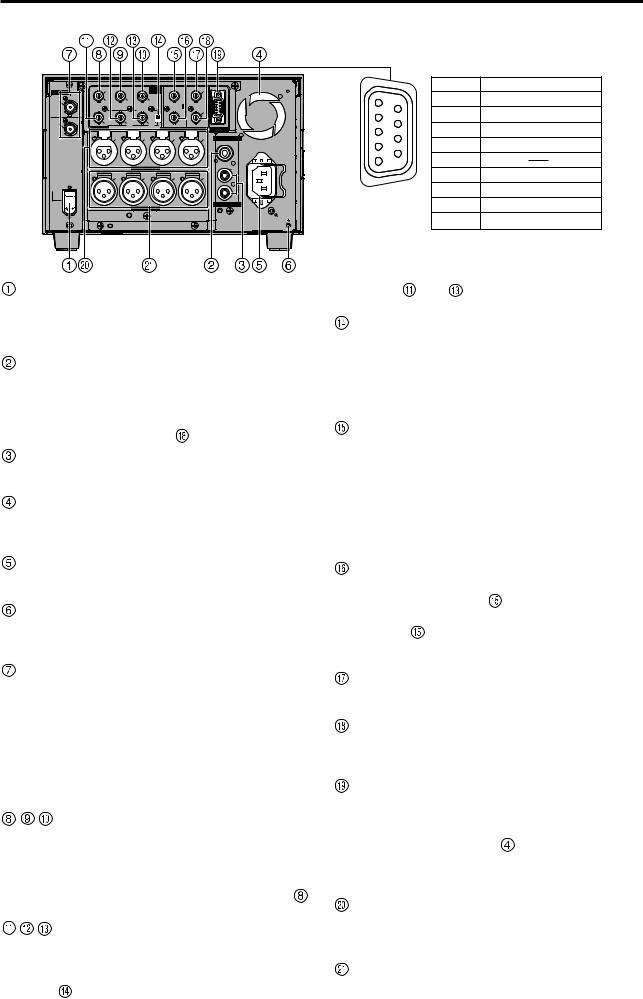
Parts and their functions (continued)
Rear panel
|
VIDEO |
|
VIDEO |
IN |
|
DIGITAL |
|
IN |
|
|
|
SDI |
|
|
|
|
|
IN |
Y |
PB |
PR |
|
|
|
|
|
750 |
|
|
|
VIDEO1 |
VIDEO2 |
AUTO |
OUT |
|
|
|
|
|||
SDI |
|
|
|
|
|
OUT |
Y |
PB |
PR |
|
|
|
VIDEO OUT |
|
REF VIDEO IN |
TIME CODE |
REMOTE |
|
1 |
2 |
3 |
4 |
VIDEO MON |
|
|
|
|
|
(SUPER) |
 AC IN
AC IN
AUDIO IN
CH1 |
CH2 |
CH3 |
CH4 |
DVCPRO /DV
 R
R
AUDIO MON
AUDIO OUT
SIGNAL
GND
|
|
Pin No. |
Signal |
1 |
6 |
1 |
Frame Ground |
|
|
2 |
Transmit A |
|
|
3 |
Receive B |
|
|
4 |
Receive Common |
5 |
9 |
5 |
|
|
|
6 |
Transmit Common |
|
|
7 |
Transmit B |
|
|
8 |
Receive A |
|
|
9 |
Frame Ground |
IEEE 1394 digital input/output connector |
from the |
and |
connectors when the switch has |
||||
This enables signals to be input and output using the |
been set to the VIDEO1/VIDEO2 side (top position). |
||||||
IEEE 1394 digital interface. Use a 6-pin type of |
ANALOG VIDEO OUT selector switch |
||||||
connector. |
|
||||||
|
(option: AJ-YA93P) |
|
|||||
Bus power is not supported. |
|
|
|||||
VIDEO MON connector |
|
Set this switch to the Y PB PR side (bottom position) |
|||||
|
when the ANALOG VIDEO OUT connectors are used |
||||||
Analog composite video signals are output from this |
|||||||
to output component video signals; set it to the |
|||||||
connector. |
|
||||||
|
VIDEO1/VIDEO2 side (top position) when they are |
||||||
Video signals with information superimposed on them |
|||||||
used to output composite video signals. |
|||||||
can be output. To set the superimposing to ON or |
|||||||
REF VIDEO IN connector (option: AJ-YA93P) |
|||||||
OFF, use the SUPER switch |
on the front panel. |
||||||
This is the input connector for the reference video |
|||||||
AUDIO MON (L, R) connectors |
|||||||
signal. Input a signal with color burst. |
|||||||
The playback signal from the PCM audio signals (CH1, |
Note: |
|
|
|
|||
CH2, CH3, CH4) are output from these connectors. |
Since the video or audio output signal may be |
||||||
Fan |
|
|
disrupted if the reference video signal is not input, |
||||
|
|
it is recommended that this connector be used by the |
|||||
This fan is used to cool down the VTR. |
|||||||
system which supplies the reference video signals. |
|||||||
If, for any reason, the fan stops, “E-10” will appear on |
|||||||
Use a signal where SCH does not fluctuate for the |
|||||||
the counter display. |
|
||||||
|
reference video signal. |
|
|||||
AC IN socket |
|
|
|||||
|
REF VIDEO OUT connector (option: AJ-YA93P) |
||||||
Connect one end of the power cord supplied to this |
|||||||
This is the loop-through output connector of the REF |
|||||||
socket and the other end to the power outlet. |
|||||||
VIDEO IN connector |
. When a cable is not |
||||||
SIGNAL GND terminal |
|
||||||
|
connected to this connector, the REF VIDEO IN |
||||||
This is connected to the signal ground terminal on the |
connector |
is automatically terminated by the 75 Ω |
|||||
component connected to this VTR in order to minimize |
|||||||
resistance. When a cable is connected, the 75 Ω |
|||||||
noise. It is not a safety ground. |
|
||||||
|
termination is released. |
|
|||||
SERIAL DIGITAL COMPONENT AUDIO |
|
||||||
TIME CODE IN connector (option: AJ-YA93P) |
|||||||
VIDEO IN/OUT connectors (option: AJ- |
|||||||
This connector is used for recording the external time |
|||||||
YA94G) |
|
||||||
|
code onto the tape. |
|
|
||||
Digital component audio/video signals complying with |
TIME CODE OUT connector (option: AJ-YA93P) |
||||||
the SMPTE 259M-C standard are input to and output |
|||||||
The playback time code is output from this connector |
|||||||
from these connectors. |
|
||||||
|
during playback. During recording, the time code |
||||||
Note: |
|
|
|||||
|
|
generated by the internal time code generator is output. |
|||||
The digital audio signals to be input must be |
|||||||
Remote control connector (option: AJ-YA93P) |
|||||||
synchronized with the video input signals. Otherwise, |
|||||||
noise will be generated in the audio output signals. |
This enables the unit to be connected to the external |
||||||
|
ANALOG VIDEO IN connectors |
remote controller for operation from an external source. |
|||||
|
(option: AJ-YA93P) |
|
Notes: |
|
|
|
|
|
|
• Set the CONTROL switch |
to REMOTE. |
||||
Analog component video signals are supplied to these |
|||||||
• The specifications are based on the RS-422A |
|||||||
connectors when the INPUT SELECT button on the |
|||||||
interface, and editing-related functions do not work. |
|||||||
front panel is set to Y PB PR. Analog composite video |
|||||||
In this case, use it as a player. |
|||||||
signals are supplied using the VIDEO/Y connector |
|||||||
ANALOG AUDIO IN connectors (option: AJ- |
|||||||
when the button is set to CMPST. |
|||||||
|
ANALOG VIDEO OUT connectors |
YA93P) |
|
|
|
||
|
The analog audio signals are input from these |
||||||
|
(option: AJ-YA93P) |
|
|||||
|
|
connectors. |
|
|
|
||
Analog component video signals are output from these |
ANALOG AUDIO OUT connectors (option: AJ- |
||||||
connectors when the ANALOG VIDEO OUT selector |
|||||||
switch |
has been set to the Y PB PR side (bottom |
YA93P) |
|
|
|
||
position). Analog composite video signals are output |
The analog audio signals are output from these |
||||||
– 12 – connectors.
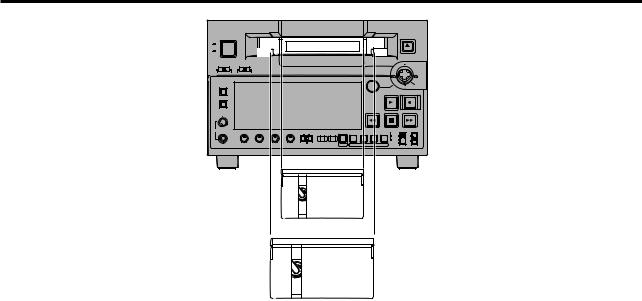
Tapes
|
POWER |
|
|
|
|
|
|
|
|
|
|
|
EJECT |
|
ON |
|
|
|
|
|
|
|
|
|
|
|
|
|
|
OFF |
|
|
|
|
|
|
|
|
|
|
|
|
|
|
CONTROL |
REC INHIBIT |
|
|
|
|
|
|
|
|
|
|
|
||
LOCAL |
REMOTE |
OFF |
ON |
|
|
|
|
|
|
|
|
|
|
|
METER |
|
|
|
|
|
|
|
|
|
|
|
|
PUSH |
|
FULL/FINE |
|
|
|
|
|
|
|
|
|
|
|
|
SHTL/SLOW |
|
|
|
|
|
|
|
|
|
|
|
SEARCH |
PLAY |
|
REC |
|
|
|
|
|
|
|
|
|
|
|
|
|
|
||
MONITOR SEL |
|
|
|
|
|
|
|
|
|
|
|
|
|
|
|
|
|
|
|
|
|
|
|
|
|
REW |
STOP |
|
FF |
HEADPHONES |
CH 1 |
CH 2 |
CH 3 |
CH 4 |
REC PB |
INPUT SELECT |
COUNTER RESET |
TC |
INT |
TCG |
SUPER |
|||
|
|
VIDEO |
AUDIO |
PRESET |
MENU |
|
ON |
|||||||
|
|
|
|
|
|
|
|
|
|
REGEN |
|
|||
|
|
|
|
|
|
|
|
|
|
|
|
PRESET |
|
OFF |
|
|
|
|
|
|
|
|
|
|
|
|
EXT |
|
|
|
|
|
|
|
|
UNITY |
|
PF |
PF1 |
PF2 |
PF3 |
DIAG |
|
|
M cassette size |
|
|
|
|
|
|
|
|
|
|
|
|
||
|
Align the center of the cassette with the center |
|
L cassette size |
of the insertion slot, and press it in gently. |
|
The cassette tape will load automatically. |
||
|
Consumer-use DV and DVCAM cassettes
(Standard DV and DVCAM cassettes, mini DV and DVCAM cassettes)
•Use a cassette adapter (AJ-CS455P) when a mini DV or DVCAM cassette is to be used.
Note that inserting a mini DV or DVCAM cassette without the use of a cassette adapter will cause malfunctioning.
Also note that long-duration mini DV cassettes (80 minutes in the standard mode and 120 minutes in the LP mode) cannot be used.
•It is not possible to play back tapes which have been recorded in the LP mode.
•When editing material recorded on a consumer-use DV or DVCAM cassette, first record the material on a DVCPRO tape or other tape used by VTRs for broadcast applications.
•The maximum transport speed of a mini DV or DVCAM cassette tape is 32x.
•The images may be subject to disturbance during the slow motion playback of consumer-use DV and DVCAM cassette tapes.
•From the perspective of protecting consumer-use DV and DVCAM cassette tapes, minimize the number of times the tapes are cued up at the same locations as much as possible.
•When consumer-use DV and DVCAM cassette tapes are used, the maximum time for STILL TIMER is set to 10 seconds.
It is recommended that tapes bearing the Panasonic brand be used as the consumer-use DV tapes.
M cassettes
Tapes capable of up to 33 minutes of recording or playback
(AJ-5P23MP, AJ-5P33MP)
L cassettes
Tapes capable of up to 92 minutes of recording or playback
(AJ-5P63LP, AJ-5P92LP)
•Use AJ-5P92LP tapes which have been recorded using the DVCPRO (25M) format in a VTR that supports 184 minutes of DVCPRO (25M) format recording and playback.
– 13 –

IEEE 1394 digital interface
The recording format for IEEE 1394 digital input data is determined based on the table below.
Setup menu |
|
|
|
No. 012 |
Input data |
Recording format |
|
(SYS FORMAT) |
data |
||
|
|||
settings |
|
|
|
|
|
|
|
|
DVCPRO50 |
DVCPRO50 |
|
50M |
DVCPRO |
Recording not possible |
|
|
DV |
Recording not possible |
|
|
DVCPRO50 |
Recording not possible |
|
|
DVCPRO |
DVCPRO |
|
25M |
|
For AJ-SD93P 1: |
|
DV |
DVCPRO |
||
|
|||
|
For AJ-SD93E: |
||
|
|
||
|
|
Recording not possible |
 1 If the audio of the input data is 32 kHz/4CH, CH1/CH2 and CH3/CH4 can be selected in setup menu No. 889 (DIF AUD IN).
1 If the audio of the input data is 32 kHz/4CH, CH1/CH2 and CH3/CH4 can be selected in setup menu No. 889 (DIF AUD IN).
For AJ-SD93P:
The format for IEEE 1394 digital output data is determined based on the setup menu No. 881 (DIF TYPE) setting and playback tape (mode).
|
Setup menu |
Setup menu |
|
|
|
No. 012 |
No. 881 |
Output data |
|
Mode |
(SYS |
|||
(DIF TYPE) |
format |
|||
|
FORMAT) |
|||
|
setting |
|
||
|
setting |
|
||
|
|
|
||
|
|
|
|
|
During |
|
|
|
|
DVCPRO50 |
– |
– |
DVCPRO50 |
|
tape playback |
|
|
|
|
During |
– |
AUTO |
DVCPRO |
|
DVCPRO |
– |
DVCPRO |
DVCPRO |
|
tape playback |
– |
DV |
DV |
|
During |
– |
AUTO |
DV |
|
DV/DVCAM |
– |
DVCPRO |
DVCPRO |
|
tape playback |
– |
DV |
DV |
|
|
50 M |
– |
DVCPRO50 |
|
During |
25 M |
AUTO |
DVCPRO |
|
EJECT or E-E |
|
DVCPRO |
DVCPRO |
|
|
|
DV |
DV |
Precautions for use
•Connect the interface with another device on a 1:1 basis.
•If the E-92 warning (1394 INITIAL ERROR) is displayed, either re-connect the connecting cable or turn the VTR’s power off and back on.
•The AV signals may be disrupted when the power of the connected devices is turned on or off and when the interface cable is connected or disconnected.
•When the input signals are switched or the mode is transferred, it may take a few seconds for the system to stabilize. Proceed with the recording operation only after the system has stabilized.
•The following situation applies when recording is to be performed by selecting the IEEE 1394 digital interface input, and it applies with the signals which are output by the IEEE 1394 digital interface.
-The audio level control knobs on the front panel do not work.
-The settings in the 800 series of setup menu items concerning the vertical blanking period are ignored.
-When playback signals other than regular 1x speed playback signals have been input, no guarantees are made for the pictures and sound which will be recorded or for the EE-type pictures and sound.
•The following situation applies when the video input selection has been set as the IEEE 1394 digital interface.
-The SDI signals, the analog video output signals and time code output signals become irregular in the E-E mode. Do not use these signals for recording purposes. (The teletext signals and other signals superimposed onto the video output signals also become irregular.)
•During SLOW/STILL playback, unprocessed video and audio signals are output as the IEEE 1394 digital interface output. When these video and audio signals are monitored using another device, they may differ from the video and audio signals played back by this unit.
For AJ-SD93E:
The format for IEEE 1394 digital output data is determined based on the playback tape (mode).
|
Setup menu |
|
|
|
No. 012 |
Output data |
|
Mode |
(SYS |
||
format |
|||
|
FORMAT) |
||
|
|
||
|
setting |
|
|
|
|
|
|
During |
|
|
|
DVCPRO50 |
– |
DVCPRO50 |
|
tape playback |
|
|
|
During |
|
|
|
DVCPRO |
– |
DVCPRO |
|
tape playback |
|
|
|
During |
|
|
|
DV/DVCAM |
– |
DV |
|
tape playback |
|
|
|
During |
50 M |
DVCPRO50 |
|
EJECT or E-E |
25 M |
DVCPRO |
Be absolutely sure not to defeat the following safeguards when connecting the IEEE 1394 cable.
(1)Ensure that the unit and all devices to be connected are grounded (or connected to a common ground).
If the equipment cannot be grounded, first turn off the power of all the connected devices, and then disconnect and re-connect the IEEE 1394 cable.
(2)When connecting the unit to a device equipped with a 4-pin connector, connect the unit’s connector (6-pin type) first.
(3)When making a connection to a PC equipped with a 6-pin connector, connect the 1394 cable so that it mates properly with the 1394 connector. Bear in mind that if the plug is inserted the wrong way round, the unit may be damaged as a result.
– 14 –
